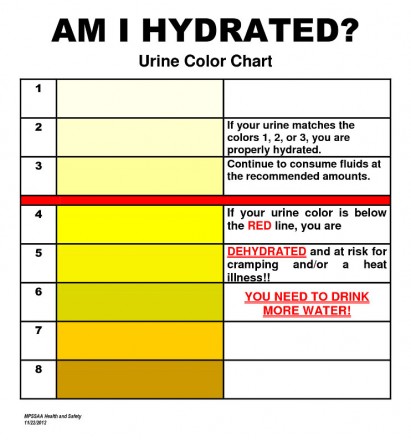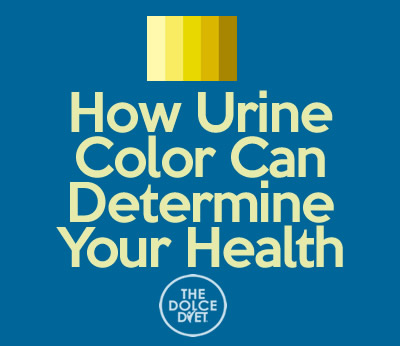DOLCE DIET LIFESTYLE:
Use Your Urine Color to Help Determine Your Health Status
by Samantha Coogan, MS, RDN, LD
Urine can be an excellent indicator of your health status. Anything from the foods you eat, to medications, to laxatives can affect your urine color. Use this quick visual test as a kick-starter to investigating your health. A urinalysis test (this can test for sugar in the urine for diabetes, which won’t affect the color) will give you the most accurate results and ways to treat your condition, but a quick glance at the toilet can tell you a lot.

1. Clear/Transparent
You may be too hydrated. Water intoxication can cause your blood sodium levels to deplete, leading to disorientation and loss of motor function. Water is great, but like all things, in moderation.
2. Pale Yellow/Lemonade-like
You’re optimally hydrated!
3. Transparent Yellow (slightly darker than above)
Normal
4. Dark Yellow
Normal, especially in the morning, but get some water in ASAP
5. Amber/Honey/Apple Juice-like
You’re dehydrated. Drink more water!
6. Syrup-color
You could have some liver issue occurring or severe dehydration. See your doctor and keep drinking water.
7. Pinkish
This could occur if you’ve recently eaten beets, blueberries or rhubarb. If not, that means there is probably blood in there. It could be anything from nothing to kidney disease, urinary tract infection, tumors, prostate problems or something worse. Ladies, keep in mind that this will occur during your menstrual cycle, which is totally normal.
8. Orange
This could be from something you ate with food dye, or a liver or bile duct condition in which bilirubin is entering the urine. Contact your doctor ASAP.
9. Blue or Green
Not super common, but could be a sign of a genetic disorder or a bacterial infection in the urinary tract. It could also be from something you ate with food dye in it or from certain medications. Contact a doctor just to double check.
10. Foaming or Fizzing
Typically harmless, but could indicate excessive protein intake or a kidney issue. See a doctor if it happens frequently. Occasional occurrences aren’t usually cause for concern.






